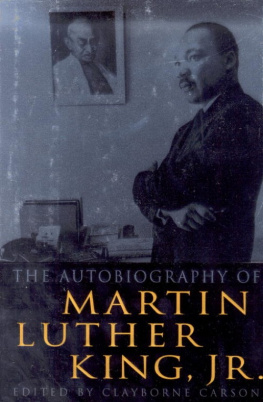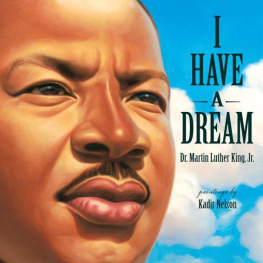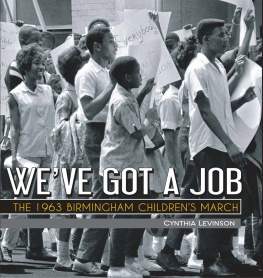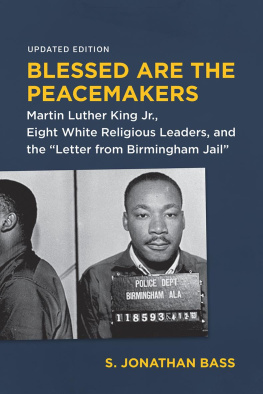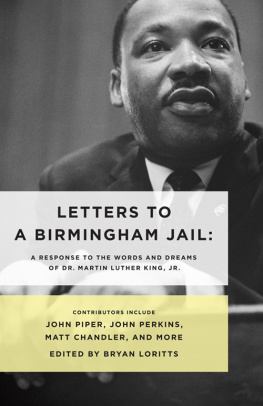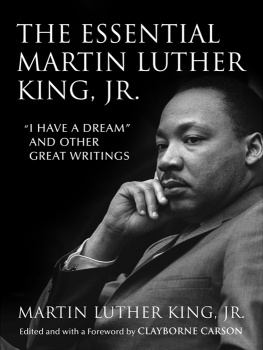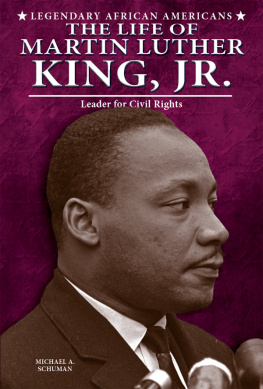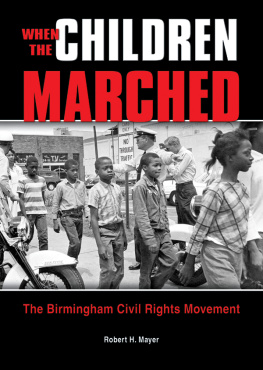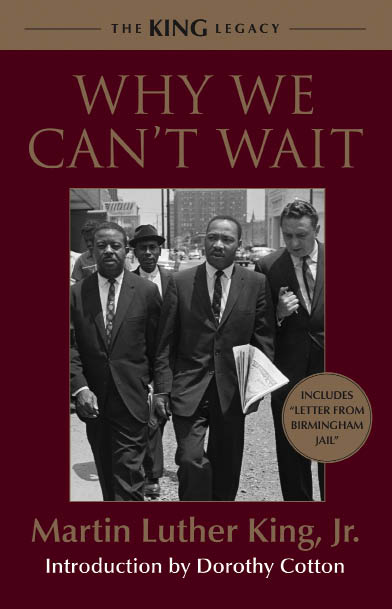WHY WE CANT WAIT
MARTIN LUTHER KING, JR.
Beacon Press, Boston
TO MY CHILDREN
YolandaMartin IIIDexterBernice
for whom I dream that one day soon
they will no longer be judged by the color of
their skin but by the content of their character
I acknowledge with affection and gratitude
the help of Hermine I. Popper, whose
perception and intelligence enabled her to
do a constructive and important editorial job.
I am also grateful to Alfred Duckett for his efforts
and suggestions in the early stages of my manuscript.
Contents
Introduction
In 1963, Birmingham was often called the most segregated city in America. Our freedom struggle there revealed how brutal and pervasive the segregation pattern was and how challenging and difficult this part of our journey would be. The more we demanded our rights as citizens, the more hatred and violence we encountered from segregationist public officials. Despite the intense opposition, however, hundreds of Birmingham citizens joined the struggle to bring about change. Marching for freedom and submitting to jailing became an ordinary daily event. But there came a time when the jails were full, even when police started to confine other arrested protesters in the local fairground.
It was Good Friday, and there was a church full of people waiting to march for freedom with Dr. Martin Luther King, Jr., leading them. Their objectives included the elimination of Birminghams rigid segregation. They wanted the right to vote. They wanted jobs and the ability to try on clothes in all the places where they shopped. They wanted public schools opened to all children without regard to the color of their skin. Even in the liquor stores African Americans were required to form a separate waiting line in order to be served. Still we continued to sing, We would not let anything turn us around, as one of our popular freedom songs intoned.
With this backdrop, I was there when Martin faced his most poignant decision in the midst of the Birmingham struggle. The jails were full, and protestors were awaiting bail, but we were out of money. In room 30 of the A. G. Gaston Motel, there was a long and a very intense meeting that brought together local Birmingham civic leaders with Dr. King and his Southern Christian Leadership Conference (S.C.L.C.) team. All of us had responded to the call from the Reverend Fred Shuttlesworth, the local civil rights leader who had invited Dr. King to Birmingham. With a church full of people waiting for Dr. King to lead another peaceful march through the downtown area, we had to determine. We had called a boycott to bring attention to the reason for our struggle, because we wanted the business community to understand the goals of our movement.
In this book, Martin recalls his experience of heartfelt despair as he quietly listened to the heated arguments about whether he should concentrate on raising money that would be used to bail out the hundreds of people already incarcerated or should go to jail himself, as he had urged so many others to do just thatnot only in Birmingham but in hotbeds of protest activity in other cities.
I still cry as I read about the agony he felt as he listened to all of us in room 30. Most of us urged him to stay out of jail at this point because of the urgent need for bail money. Martin recalled that there were twenty-four pairs of eyes upon him. At that moment, he had come face to face with himself as leader. After all, he had encouraged people from across the community to accept suffering, to accept jailing. It would not be only the eyes of the people of Birmingham on him but the eyes and ears of people nationwide. He was alone in that crowded room.
After enduring his silent agony, he communicated in no uncertain terms that he had made his decision. Without saying anything, he stood up and walked into the adjoining bedroom. When he reentered the parlor where we were gathered, he had put on his marching clothes. We could see that there was no longer a need to ponder his choices. Words could not have communicated more powerfully that he had made his decision. The debate was over.
He later explained that he could not encourage hundreds of people to make a stunning sacrifice and then excuse himself. We stood, made a circle, and crossed and held hands, as was our custom, and sang We Shall Overcome, the anthem of our movement. Some of us sang with tears in our eyes. It was a powerful moment.
Martins decision to go to jail was a crucial turning point for the civil rights struggle. Although he was placed in solitary confinement, his spirit was lifted when his lawyers were finally allowed to visit him. Clarence Jones brought the encouraging news that Harry Belafonte had been able to raise fifty thousand dollars for bail bonds. Those of us who participated in that argument in room 30 of the Gaston Motel realized that Martin had made the right decision, both morally and tactically.
While in jail Martin would write his most profound explanation of our nonviolent strategy. His now well-known Letter from Birmingham Jail was a response to a group of white Birmingham clergymen who severely criticized him as an outside agitator. Martins detailed defense can be summarized in the poetic line Injustice anywhere is a threat to justice everywhere.
Soon the whole country and indeed the whole world would take note of our work in Birmingham, our determination to be free. In this book, Dr. King explains, in the clearest way Ive ever heard, how nonviolenceThe Sword that Healscan become a powerful tool to transform, and thereby to transform systems designed to abuse people. He explains how all African Americans involved in our own liberation struggle came to embody the dignity of moral conviction and self-sacrifice. Importantly, he explains here how the way of nonviolence heals the oppressed as well as the oppressor. Rather than simply expressing hurt, anger, and victimhood, oppressed people can experience the healing necessary for bringing about the Beloved Community. It had indeed been Bull Connors Birmingham, but with Martin King, Jr., and Fred Shuttlesworth and other committed people working together, there emerged A New Day in Birmingham.
Another tool Dr. King describes in this book is the importance of freedom songs. He shows how and why the songs were the soul of the movement, explaining that they are more than just incantations of clever phrases, but also adaptations of the songs the slaves sang.
We learned some important lessons in our Birmingham struggle, and we need to apply those lessons now. As Martin said, We cant wait. We cannot wait, because the jails are full of young black men, including many who are fathers but unable to parent their children. We cant wait, because we know now that failing to make education a priority cheats the country of latent talent. We cant wait, because our young men and women are being programmed to kill (its called serving our country).
None of this is to suggest that the road ahead will be easy. The Birmingham struggle was difficult. But I remember something a white Birmingham businessman told me many years after the events recounted in this book. Mr. Emil Hess had the courage to acknowledge that Birmingham had catapulted America into the twentieth century.
If we heed Martin Luther Kings call today, we can launch a struggle that can catapult our nation into a new century of even more exciting progress toward the ideal of peace with social justice.
DOROTHY F. COTTON
Introduction
It is the beginning of the year of our Lord 1963.
I see a young Negro boy. He is sitting on a stoop in front of a vermin-infested apartment house in Harlem. The stench of garbage is in the halls. The drunks, the jobless, the junkies are shadow figures of his everyday world. The boy goes to a school attended mostly by Negro students with a scattering of Puerto Ricans. His father is one of the jobless. His mother is a sleep-in domestic, working for a family on Long Island.



